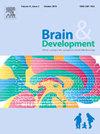Alleviating stress and perceived stigma in parents after febrile seizure in their children
IF 1.3
4区 医学
Q4 CLINICAL NEUROLOGY
引用次数: 0
Abstract
Objectives
Febrile seizure (FS) is a worrisome event for parents. This study aimed to investigate how stress and perceived stigma are alleviated after experience FS in their children.
Methods
Parents who visited hospitals because of FS exhibited by their children were invited to participate this study. One hundred and sixty-one parents answered the questionnaire (1st Q); among them, 52 parents answered the same questionnaire (2nd Q) after 3 months. The questionnaire consisted of the Impact of Event Scale-Revised (IES-R) and the Parent Stigma Scale (PSS). The scores between the 1st Q and 2nd Q were compared with 52 participants who answered both questionnaires.
Results
The median value of the IES-R total score was 11, and 20 participants showed >24 in the 1st Q (n = 161). IES-R subscales of Intrusion and Hyperarousal symptoms and one item of PSS, “people who know your children have a FS treat your children differently”, decreased significantly (p<0.010, p = 0.013 and p = 0.038, respectively) from the 1st Q (n = 52) to 2nd Q (n = 52). Parents with children having a past history of FS showed significantly higher PSS scores than parents with children having first FS episode (p = 0.029) in the 1st Q (n = 161). Parents who had some knowledge about FS could deal significantly more appropriately with FS attacks compared with those who had no prior knowledge (p<0.001) in both the 1st Q (n = 161) and 2nd Q (n = 52).
Conclusions
Stress and stigma in parents were reduced to some extent 3 months after the FS attacks in their children. Recurrent FS can cause a transient perception of parental stigma. Appropriate education regarding correct management before experiencing the first episode of FS may be important.
减轻儿童热性惊厥后父母的压力和耻辱感
目的热性惊厥(FS)是困扰家长的一件大事。本研究旨在探讨儿童在经历FS后,压力和感知耻辱是如何减轻的。方法邀请因孩子表现出FS而到医院就诊的家长参与本研究。161名家长回答了问卷(第1题);其中,52名家长在3个月后回答了同样的问卷(第二题)。问卷由事件影响量表(IES-R)和父母污耻感量表(PSS)组成。将第1和第2题的得分与52名同时回答两份问卷的参与者进行比较。结果IES-R总分中位值为11分,其中20例(161例)在第1季表现为24分。在第一季度(n = 52)至第二季度(n = 52),入侵和过度唤醒症状的es - r分量表和PSS的一项“知道你的孩子有FS的人对你的孩子有不同的看法”显著下降(p<0.010, p = 0.013和p = 0.038)。有FS病史的家长在第一季度的PSS评分显著高于有FS首次发作的家长(p = 0.029) (n = 161)。在第1问(n = 161)和第2问(n = 52)中,对FS有一定了解的家长比不了解FS的家长更能恰当地应对FS攻击(p<0.001)。结论儿童FS发作3个月后,家长的压力和耻辱感有一定程度的减轻。复发性FS可引起短暂的亲代耻辱感。在经历第一次FS发作之前,适当的关于正确管理的教育可能是重要的。
本文章由计算机程序翻译,如有差异,请以英文原文为准。
求助全文
约1分钟内获得全文
求助全文
来源期刊

Brain & Development
医学-临床神经学
CiteScore
3.60
自引率
0.00%
发文量
153
审稿时长
50 days
期刊介绍:
Brain and Development (ISSN 0387-7604) is the Official Journal of the Japanese Society of Child Neurology, and is aimed to promote clinical child neurology and developmental neuroscience.
The journal is devoted to publishing Review Articles, Full Length Original Papers, Case Reports and Letters to the Editor in the field of Child Neurology and related sciences. Proceedings of meetings, and professional announcements will be published at the Editor''s discretion. Letters concerning articles published in Brain and Development and other relevant issues are also welcome.
 求助内容:
求助内容: 应助结果提醒方式:
应助结果提醒方式:


